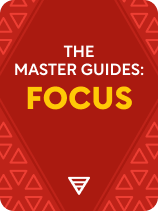

This article is an excerpt from the Shortform book guide to "The Master Guides: Focus" by Shortform. Shortform has the world's best summaries and analyses of books you should be reading.
Like this article? Sign up for a free trial here.
Want to know how to avoid distractions and stay focused? How does your environment affect your ability to focus?
Your environment can have a big impact on your ability to concentrate, so it’s important to take control of it if you’re looking for a way to stay focused and avoid distractions. Experts claim you can try different strategies to optimize your physical space and daily routine to create a more productive life.
Read on for five tips on how to avoid distractions and stay focused, plus a practical exercise at the end.
How to Avoid Distractions and Stay Focused
If you’re wondering how to avoid distractions and stay focused, it’s likely that you’re struggling to stay on task or be as productive as you’d like. Because distraction is the enemy of focus and many triggers of distraction come from your environment, it’s essential to take control of your environment. To create the optimal environment to avoid distractions and stay focused, consider these tips from the experts.
Tip #1: Optimize your physical space. In Eat That Frog!, business consultant Brian Tracy recommends that you make sure you have everything you’ll need in front of you before you begin, so you’re not distracted by looking for things later. Clear your desk by setting aside unrelated work so you have only one task in front of you. Assemble all the documents and materials you’ll need and keep them within easy reach. Ensure that your work area is comfortable and as distraction-free as possible. The cleaner and more organized it is, the easier it will be to get started and work efficiently.
Tip #2: Take advantage of daily rhythms and routines. In Hyperfocus, Chris Bailey recommends that you choose when to focus based on your schedule, your energy levels, and your tasks. Attention requires both time and energy, so schedule your focus sessions when you have both available. In Make Time, Jake Knapp and John Zeratsky also emphasize the importance of determining whether you function better in the morning, afternoon, or evening. For some people, the early morning is when they’re able to concentrate best. For others, late at night is the only time when they’re able to avoid distractions and stay focused.
In Essentialism, Greg McKeown suggests that after identifying the best time of day to focus, make your daily plan a routine. Establishing a routine is a powerful technique for accomplishing essential tasks because when you follow a routine, you free up mental space. With a routine, you can act automatically without expending energy figuring out what’s next or fighting the pull of nonessential distractions.
Tip #3: Make commitments to yourself. Nir Eyal suggests in Indistractable that you make precommitments as a way to minimize the power of distraction. He defines “precommitments” as choices you make while in an undistracted state that will help guide your behaviors when you’re tempted by distraction. Some precommitments make it more difficult to do something undesirable. This extra bit of difficulty gives you a moment to pause and stop yourself from becoming distracted. Some precommitments use money as an incentive, while others align your behaviors with the identity you want to have—such as that of a person who finishes what they start.
Reflect and Refine
Given the various approaches to avoiding distractions and staying focused described by the experts, you’ll have to engage in personal reflection and a little trial-and-error to see what works for you. This will involve developing an understanding of how you make use of your time, how you deal with unexpected disruptions, and what changes you need to make to your process in order to best direct your energy and attention.
Tip #4: Fine-tune your time management. If you schedule time to focus on different tasks, computer science professor Cal Newport suggests reviewing the accuracy of your time blocks at the end of each day. In Deep Work, he says this will help you set more accurate goals and expectations in the future.
In Procrastination, Jane Burka and Lenora Yuen argue that learning how to avoid distractions and stay focused also means building your capacity to work within time constraints by developing a realistic sense of how time flows. One strategy for this is estimating tasks’ duration. Before you begin a task, predict how long it will take you. After you’re done, reflect on the difference between your prediction and reality. This exercise will develop your ability to set realistic expectations for how long a task will take.
Tip #5: Assess how well you maintain your focus. As you move through your week, you’ll face unexpected changes in your schedule and will need to make decisions about how to proceed. Steven Covey advises in First Things First that at the end of each week, stop and consider how the week went. Did you face challenges? How did you handle spur-of-the-moment decisions? Did you successfully stay focused on your goals, and were your expectations realistic? Keeping a daily log of your progress, as Knapp and Zeratsky suggest, will also give you a clearer picture of any adjustments to make in the future. Record whether you maintained your focus, which tactics you employed, and how you might tweak them to your advantage.
By trying what works and what doesn’t for you personally, you can incrementally rearrange your life in a way that will be transformative over time.
Exercise: Start to Improve Your Focus
On the subject of how to avoid distractions and stay focused, most authors and experts agree that you should focus on one thing at a time, use your schedule to your advantage, and eliminate as many distractions as you can. Consider how you can apply these principles in your daily life.
- What overarching project or ambition do you wish you could devote more time and energy to? Does it revolve around your career, your family, or a personal goal? How much time each day would you have to devote in order to achieve it?
- If you had complete control over your schedule, when would you focus on this one, special project? Is there a way to tweak your current schedule to open up a window in which to focus on your goal? If so, how?
- What is the primary distraction that interrupts your daily activities? During the time in which you focus on your goal, what would be the most effective way to eliminate that distraction?

———End of Preview———
Like what you just read? Read the rest of the world's best book summary and analysis of Shortform's "The Master Guides: Focus" at Shortform.
Here's what you'll find in our full The Master Guides: Focus summary:
- A compilation of the best strategies from experts on improving focus
- How improved focus can improve your career and personal life
- How to create a distraction-free working environment






